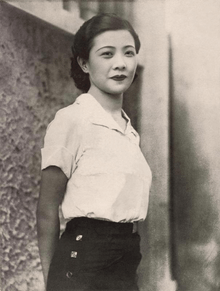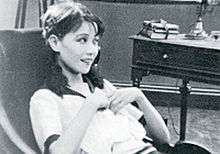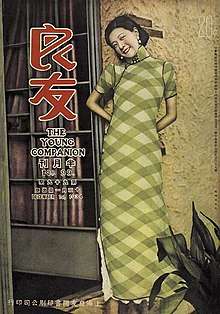Ruan Lingyu
Ruan Lingyu (April 26, 1910 – March 8, 1936), born Ruan Fenggen, also known by her English name Lily Yuen, was a Chinese silent film actress. One of the most prominent Chinese film stars of the 1930s, her exceptional acting ability and suicide at the age of 25 led her to become an icon of Chinese cinema.
Ruan Lingyu | |
|---|---|
 Ruan in 1935 | |
| Born | Ruan Fenggen (阮鳳根) April 26, 1910 |
| Died | March 8, 1935 (aged 24) |
| Cause of death | Suicide by barbiturate overdose |
| Occupation | Actress |
| Years active | 1927–1935 |
Her films Little Boys (Playthings) (1933), Goddess (1934) and New Women (1935) are available with English subtitles on YouTube.[1]
Early life
Ruan was born to a working class family in Shanghai. Her father died when she was young, and her mother brought her up working as a housemaid.
Career
Acting career

In 1926, to help make ends meet, Ruan signed up for the prominent Mingxing Film Company. She made her first film at the age of 16. The film, A Married Couple in Name Only (掛名的夫妻/挂名的夫妻), was directed by Bu Wancang.[2] Two years later, she was signed by Da Zhonghua Baihe Company (大中華百合公司/大中华百合公司), where she shot six films.[3] Her first big break came in Spring Dream of an Old Capital (故都春夢 or Reminiscences of Beijing, 1930) which was a massive hit in China. It was Ruan's first major work after signing with the newly formed Lianhua Studio in 1930. In it, she played a prostitute by the name of Yanyan.
Breakthrough and personal struggles
Thereafter, Ruan became Lianhua's major film star. Her most memorable works came after 1931, starting with the melodrama Love and Duty (directed by Bu Wancang). Ruan had by then gained popularity owing to a string of lead roles, and in 1933 she was voted second runner-up in a poll held by Star Daily (明星日報) for China's "movie queen". (Hu Die emerged the winner and Chen Yumei was first runner-up).[4] Beginning with Three Modern Women (1932), Ruan started collaborating with a group of leftist Chinese directors.
Final days before death
In Little Toys (1933), a film by Sun Yu, Ruan played a long-suffering toy-maker. Her next film, The Goddess (1934; dir: Wu Yonggang), is often hailed as the pinnacle of Chinese silent cinema; Ruan sympathetically portrayed a prostitute bringing up a child. Later that year, Ruan made her penultimate film, New Women (directed by Cai Chusheng), in which she played an educated woman forced to death by an unfeeling society. The film was based on the life of actress Ai Xia, who killed herself in 1934.[5] Her final film, National Customs, was released shortly after her death.
One of Ruan's earliest films, Love and Duty (1931), directed by Bu Wancang, was discovered in Uruguay in 1994.[6]
Personal life

At the age of 16, Ruan became acquainted with Zhang Damin (张达民/張達民), whose family her mother worked for. Zhang was later driven out of his wealthy family due to his spendthrift ways and became a chronic gambler, supported by Ruan's salary. Unable to tolerate Zhang's gambling, Ruan split with him in 1933.[7] She then began living with Tang Jishan, a tea tycoon. In 1935, Zhang filed a lawsuit asking for reparations from Ruan. The tabloids seized on this opportunity to probe into Ruan's private life and put her under intense pressure.[8]
Following the completion of New Women, Ruan's life began to unravel. The film opened in Shanghai in 1935. Cai Chusheng was under massive pressure from tabloid reporters, who were extremely hostile, owing to the scathing depiction of the Shanghai tabloids in the movie. Cai was forced to make extensive cuts to the film. Even after that, Ruan's private life was mercilessly seized upon by the tabloids and her lawsuit with her first husband, Zhang Damin, became a source of vindictive coverage.
Death
Faced with her various public issues and intense private problems, Ruan committed suicide by using overdose of barbiturates in Shanghai on March 8, 1935, at the age of 24. Her suicide note apparently contained a line which says "gossip is a fearful thing" (人言可畏), although recent researchers have doubted the note's authenticity as it appeared to have been forged by Tang Jishan.[8] Even China's preeminent intellectual Lu Xun was appalled at the details surrounding Ruan's death and wrote an essay entitled "Gossip is a Fearful Thing", denouncing the tabloids.[9]
Recent researchers believe her deteriorating abusive relationship with Tang Jishan and Zhang Damin's law suit were the cause to Ruan’s death. It was further intensified by the mob media of China after New Women was released, since the film depicted the life of actress Ai Xia, who committed suicide due to media rumors on her private life. Ruan is also believed to have been physically abused when she died before that evening.[8]
Funeral services and subsequent tributes
Her funeral service at the Wanguo Funeral Home lasted for three days. Several well-known film actors and actress attended her funeral, including Wang Renmei, Lin Chuchu and Liang Saizhen, and her pallbearers included some of the leading film directors like Lai Man-Wai, Fei Mu, Wu Yonggang and Cai Chusheng. After the service, Ruan's casket was taken to a cemetery in Zhabei district.
Her funeral procession was reportedly 3 miles (4.8 km) long, with three women committing suicide during the event. The New York Times called it "the most spectacular funeral of the century".[10]
Ruan Lingyu's tomb was ruined during the Cultural Revolution which occurred from 1966 to 1976.[11]
In 1996, a uniquely designed monument dedicated to her was erected in Fushou Memorial Garden in Shanghai.
Portrayal in popular culture
Films
Zhang Damin, who tried to tell his story regarding Ruan's suicide (and profit financially), agreed in 1935 to star as himself in a film titled Tears of Love (情淚). The film was aborted following angry backlash. Zhang did not give up, however. In 1937, a Hong Kong film titled Who's to Blame? (誰之過) directed by Shum Kat-sing (沈吉誠) appeared, starring Zhang as himself and Tam Yuk Lan (譚玉蘭) as Ruan; this may have been the same film as Tears of Love. In 1938, Zhang starred in yet another Hong Kong film, Wife of a Friend (朋友之妻), written and directed by Mak Tai-fung (麥大豐). This film did not invoke Ruan's name, but the reference cannot be more obvious: according to a handbill, the film told about an immoral womanizer who abandons his own wife to seduce his friend's, with the friend's wife committing suicide in the end. Neither film seems extant, and Zhang died from an illness later in 1938 in Hong Kong, apparently broke and penniless.
In 1991, Hong Kong director Stanley Kwan made a movie about her life, Center Stage, starring Maggie Cheung as Ruan Lingyu. Cheung won the Berlin Film Festival Silver Bear for Best Actress.[12] Zhang Damin and Tang Jishan are portrayed by Lawrence Ng and Chin Han respectively.
TV series
In 1985, Cecilia Wong (黃杏秀) played Ruan in a 20-episode TV series aired on Asia Television, titled Ruan Lingyu.
In 2005, Jacklyn Wu Chien-lien played Ruan in a 30-episode Chinese TV series, also titled Ruan Lingyu.[13]
Kong Lingjie (孔令洁) played Ruan Lingyu in the 1996 Chinese TV series Movie Queen Butterfly (影后胡蝶).
Filmography
| Year | English title | Original title | Role | Notes |
|---|---|---|---|---|
| 1927 | A Married Couple in Name Only | 掛名的夫妻 | Shi Miaowen | Lost |
| The Tablet of Blood and Tears | 血淚碑 | Liang Sibao | Lost | |
| Yang Kwei Fee of Peking | 北京楊貴妃 | Yang Xiaoyue | Lost | |
| The Heart of Women | 婦人心 | Lost | ||
| 1928 | The Luoyang Bridge | 蔡狀元建造洛陽橋 | Wang Yongxu | Lost |
| The White Cloud Pagoda | 白雲塔 | Pu Lüji | Lost | |
| 1929 | The Pearl Crown | 珍珠冠 | Lost | |
| Warnings for the Lovers | 情欲寶鑑 | Lost | ||
| Lonely Swan After the Calamity | 劫後孤鴻 | Lost | ||
| Attacking Nine-Dragon Mountain | 大破九龍山 | Lost | ||
| Burning Nine-Dragon Mountain | 火燒九龍山 | Lost | ||
| The Flower of the Silver Screen | 銀幕之花 | Lost | ||
| 1930 | Dream of the Ancient Capital | 故都春夢 | Lost | |
| Suicide Contract | 自殺合同 | Lost | ||
| Wild Flowers by the Road | 野草閒花 | Lilian | Lost? | |
| 1931 | Love and Duty | 戀愛與義務 |
| |
| A Spray of Plum Blossoms | 一剪梅 | Hu Zhilu (Julia) | ||
| The Peach Girl | 桃花泣血記 | Miss Lim | ||
| Yu Tang Chun | 玉堂春 | Lost | ||
| 1932 | Another Dream of the Ancient Capital | 續故都春夢 | Lost | |
| 1933 | Three Modern Women | 三个摩登女性 | Zhou Shuzhen | Lost |
| Night in the City | 城市之夜 | Daughter | Lost | |
| Little Toys | 小玩意 | Sister Ye | ||
| 1934 | Life | 人生 | Lost | |
| Coming Home | 歸來 | Survived reels are unedited | ||
| Goodbye, Shanghai | 再會吧,上海 | Partially survived, missing 3 reels | ||
| A Sea of Fragrant Snow | 香雪海 | Lost | ||
| The Goddess | 神女 | Prostitute | ||
| 1935 | New Women | 新女性 | Wei Ming | |
| National Customs | 國風 | Zhang Lan |
See also
References
- Chinese Film Classics YouTube playlist: https://www.youtube.com/playlist?list=PLhA05Qf-09xBaz_t_ynYbyZ-Porcj7bui
- "阮玲玉纪念馆生平简介-名人纪念馆-网上名人纪念馆-网络名人纪念堂-网上名人馆-地球城纪念网". Jinian.dqccc.com. Retrieved 30 October 2017.
- "Archived copy". Archived from the original on 2010-02-13. Retrieved 2010-07-01.CS1 maint: archived copy as title (link)
- "胡蝶阮玲玉谁才是真正的电影皇后(图)_文化读书频道_新浪网". Web.archive.org. 26 July 2011. Archived from the original on 26 July 2011. Retrieved 30 October 2017.
- Wang, Lingzhen (2011). Chinese Women's Cinema: Transnational Contexts. Columbia University Press. ISBN 978-0-231-15675-2. Retrieved April 15, 2015.
- "APT5 - Shanghai Goddess: Ruan Lingyu". Web.archive.org. 27 September 2013. Archived from the original on 27 September 2013. Retrieved 30 October 2017.CS1 maint: BOT: original-url status unknown (link)
- 老照片:旗袍丽质阮玲玉 与角色一样不幸(图集). CRI Online (in Chinese). 15 November 2006. Retrieved 24 January 2013.
- 1935年:阮玲玉之死. 搜狐 (in Chinese). Sohu.com Inc. 22 June 2004. Retrieved 24 January 2013.
- Yu, Wentao (2006-04-07), "Tragic Goddess", China Daily, retrieved 2009-11-14
- Cousins, Mark (2004-11-21), "The Asian aesthetic", Prospect (104), retrieved 2014-05-31
- "Fatal attractions - Global Times". www.globaltimes.cn. Retrieved 2018-12-20.
- "Archived copy". Archived from the original on 2013-11-05. Retrieved 2016-05-24.CS1 maint: archived copy as title (link)
- 吴中华 (29 November 2005). 电视剧版《阮玲玉》面世 吴倩莲表演荡气回肠. XINHUANET.com (in Chinese). Archived from the original on 6 November 2012. Retrieved 24 January 2013.
Bibliography
- Richard J. Meyer (2005). Ruan Ling-Yu: The Goddess of Shanghai. Hong Kong University Press. ISBN 962-209-395-7.
External links
| Wikimedia Commons has media related to Ruan Lingyu. |
- Ruan Lingyu on IMDb
- Ruan Lingyu at the Chinese Movie Database
- Ruan Lingyu, Queen in Silent Film Period
- The Beauty Of Shanghai - Ruan Ling Yu: The Chinese Greta Garbo (Biography, ISBN 978-1548772383)